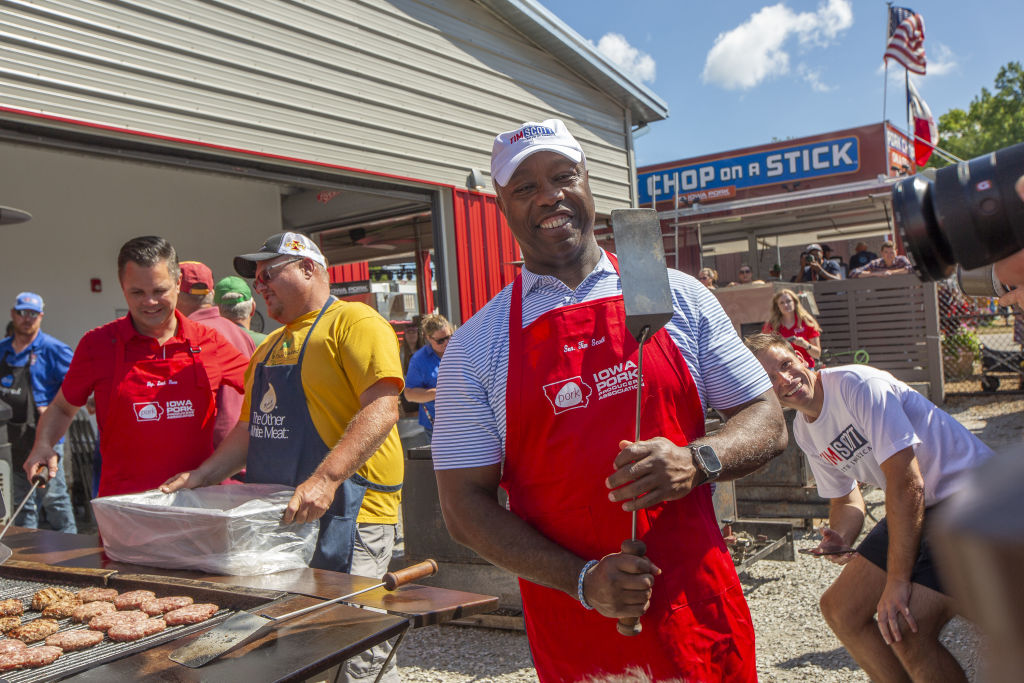
This article is part of The D.C. Brief, TIME’s politics newsletter. Sign up here to get stories like this sent to your inbox.
Every four years, ambitious consultants and hired guns sit down with aspiring presidents and sell them a lie. They deploy grandiose language and delusional sentiments like “Fundraising will be easy” and “No state is off the map” and “Heck, the race might actually be fun for the whole family.”
It is, of course, hogwash.
No political pro gets to Election Day credibly saying they ran the campaign they envisioned without adjustments. There is, quite simply, nothing that anyone can prepare candidates or their teams for the bananas nature of a national presidential campaign.
Which is why most of the Republican presidential candidates are fast approaching a crossroads: Are they running to win Iowa or the nation?
That may be an intentionally over-simplified choice and one that ignores the nuances of a race that has a quadruply indicted ex-President dominating the polling. But it cuts at the core decisions being batted around headquarters and conference calls. The candidates not named Trump basically can go all-in with early nominating states like Iowa—and, maybe, New Hampshire as a back-up plan—or make a play for a national audience in conservative media outlets.
Both approaches have potential payouts. Most strategists see Iowa as the most vulnerable Trump stands to be. The thrice-married billionaire reality show isn’t a natural fit in the evangelical corners of the Iowa GOP that is still chasing a six-week ban on abortions. Trump’s porn-star payouts aren’t exactly a natural union for these voters. Plus, the last time Trump faced a competitive caucus environment, he finished three points behind Ted Cruz. Any sign of vulnerability can open the flood gates. Perceived weakness after the New Hampshire primary in 1968 ushered Lyndon Johnson out of the race.
History shows that the smart campaigns are always thinking about both the short term and the long term. The breakout darlings are seldom suited to take advantage of it. Mike Huckabee in 2008 won the Iowa caucuses, placed third in New Hampshire and in Michigan, and almost won South Carolina on a shoestring budget, but was so broke by the time he got to Florida three weeks later he had to ditch traveling reporters because their van was a luxury. Four years later, the GOP field turned into a rotating cast of nuisances for Mitt Romney: Rick Perry, Herman Cain, Newt Gingrich, and Rick Santorum all had moments to polling ahead of him.
Even the victors in that primary had headaches. John McCain was so broke in 2007 he had to rely on the charity of his pals to ferry him around New Hampshire and used the cheapest veterans’ halls he could to beg for a second chance. Four years later, in the final weeks of 2012’s sequel, Romney dispatched his running mate, Paul Ryan, to South Carolina, Alabama, and Georgia to pick up checks as big as $25,000, instead of campaigning in swing states. And who can forget Jeb Bush’s $130 million nothingburger in 2016?
There’s a reason the unofficial motto of many a campaign manager comes from The Hitchhiker's Guide to the Galaxy: “Don’t panic.”
Most campaigns start with dreams of expansion but ultimately ambitions and optimism are never bigger than on the first day of a run. The most common shade thrown at a rival campaign is something along the lines of the campaign will never have a better day than its launch. Not even the most considered runs avoid getting sidetracked by external factors. Jim Comey’s October Surprise rocked Hillary Clinton’s headquarters. (Of course, Trump’s own Access Hollywood bombshell weeks earlier prompted TIME to melt Trump’s image for a second time on a 2016 cover.)
The polling around the current GOP field suggests most of the candidates need to pick a strategy—Iowa or the nation—instead of trying to do both poorly. Iowa remains a relatively cheap playground to run for the White House. Spending big there does not guarantee success. Tim Pawlenty in 2012 dumped hundreds of thousands of dollars for an early and symbolic test vote only to drop out of the race the next day. (It turns out, his Dairy Queen blizzards couldn’t compete with Michele Bachmann’s petting zoo. Yes, this is how we pick Presidents.) Santorum and Pete Buttigieg alike carried the state on pure elbow grease. Denting Trump could prove an efficient dollar-for-dollar way to prove potential, if not for 2024 then in 2028.
That, however, is a long game. And, at least in the era of Trump, that approach isn’t all that popular. The incentives are all wrong for such a strategic investment. With Trump hinting he will skip next week’s first debate, there are rapidly shrinking opportunities for his rivals to dethone—if not derail—him. But the folks in rival HQs need to understand that what plays well in New York doesn’t always play nicely in Newton, Iowa. And, unlike the rebroadcast markets of The Apprentice, there is no afterlife of syndication for Trump’s impersonators.
All of which explains why it may be time for Trump’s rivals to rethink their footing. Trump has enjoyed double-digit polling leads since March, and his support has only hardened since. Whatever his rivals have been trying? It isn’t working.
Make sense of what matters in Washington. Sign up for the D.C. Brief newsletter.
More Must-Reads from TIME
- How Donald Trump Won
- The Best Inventions of 2024
- Why Sleep Is the Key to Living Longer
- Robert Zemeckis Just Wants to Move You
- How to Break 8 Toxic Communication Habits
- Nicola Coughlan Bet on Herself—And Won
- Why Vinegar Is So Good for You
- Meet TIME's Newest Class of Next Generation Leaders
Write to Philip Elliott at philip.elliott@time.com